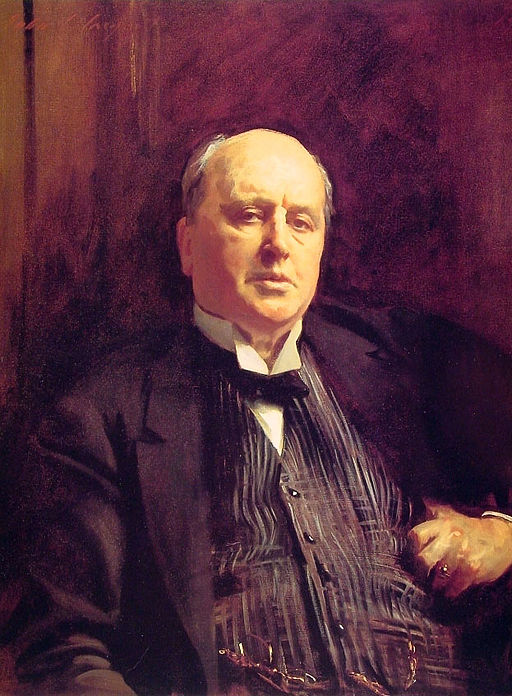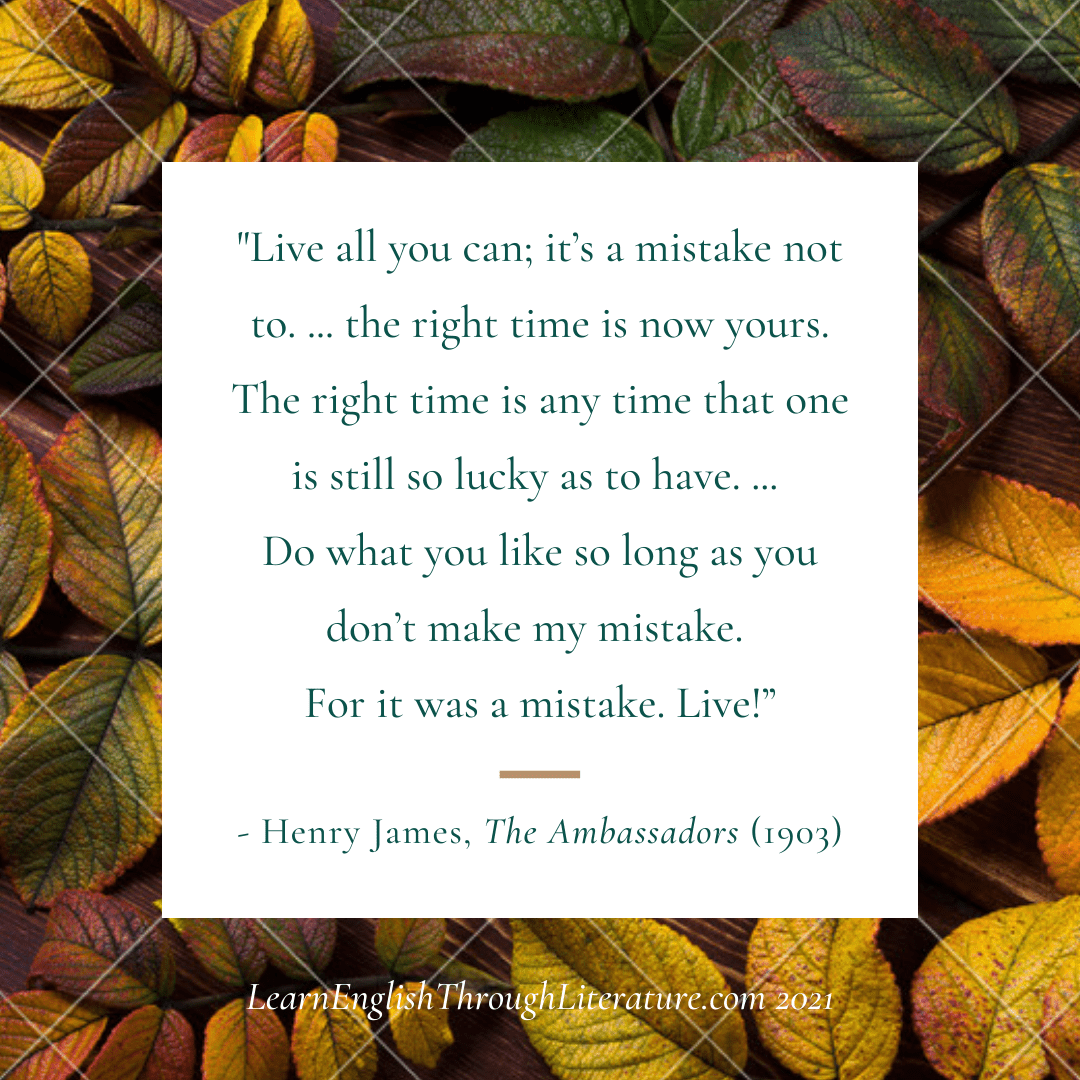📗 “Live all you can; it’s a mistake not to. It doesn’t so much matter what you do in particular so long as you have your life. If you haven’t had that what have you had? I’m too old— too old at any rate for what I see. What one loses one loses; make no mistake about that. Still, we have the illusion of freedom; therefore don’t, like me to-day, be without the memory of that illusion. I was either, at the right time, too stupid or too intelligent to have it, and now I’m a case of reaction against the mistake. Do what you like so long as you don’t make it. For it was a mistake. Live, live!”
– Henry James, The Ambassadors (1903)
…
This stirring (encouraging, inspiring) quotation comes from the mouth of Mr Strether in Henry James great classic, The Ambassadors. Strether is an American man who travels to Europe and is confronted by (faced with) the realisation that he might have lived his life differently and with more freedom had he made better choices in his youth. The novel follows his life, many friendships, and reflections, and is well worth a read (especially if you are an advanced English learner).
Henry James, the author, had some personal parallels with his novel’s main character (however, I am not suggesting that the book was autobiographical). James was born in New York City, but his family moved to Europe when he was quite young so that he lived in and developed fluency in the languages of France and Italy, before finally settling in Britain. His writing has a wonderful psychological depth to it and has sometimes been compared to the art of impressionist painters. If you are interested in reading more about him, you may enjoy some Lessons I wrote last year based on his works The Portrait of a Lady and The Aspern Papers. 👈
Given the novel’s emphasis on personal potential and purposeful action, Henry James uses the verb ‘do’ in many different ways throughout this work. I thought it would offer us a perfect text from which to consider these various uses of ‘do’ – a tiny but powerful verb that native English speakers take for granted, while many other European languages lack a word that functions like it!

Public domain, via Wikimedia Commons
📝 DO – THE VERB’S DIFFERENT DEFINITIONS
This verb is very versatile (handy, has many uses)!
..
✏️ #1 ‘Do’ is sometimes defined as ‘to perform (an action that has been referred to but not specified)’.
Here is an example of this:
📗 “I had already at that moment done something for you, in the sense of what I had said the day I went to see you; but I wasn’t then sure of the importance I might represent this as having.”
– Henry James, The Ambassadors (emphasis mine)
While we don’t know exactly what was ‘done’ in this sentence (because we are reading it apart from its proper context), the person to whom it was said knew what it was referring to. 👉 So the verb ‘to do’ shows that something was achieved or completed, even though it doesn’t always describe how it was achieved.
Here is a list of some of its common meanings:
- ✒️ Perform or take part in an action (e.g., ‘What can I do to help you?’)
- ✒️ Achieve, finish, complete, or deal with something (e.g., ‘He is happy because he did his homework early.’)
- ✒️ Work (e.g., ‘What work do you do?’)
- ✒️ Study a subject (e.g., ‘They both did history at university.’)
- ✒️ Take part in activities (e.g., ‘He did a lot of walking on his holidays.’)
- ✒️ Produce or create (e.g., ‘I did the website for that company.’)
- ✒️ Clean or make tidy (e.g., ‘She just needs to do her make-up.’)
- ✒️ Be acceptable or enough (e.g., ‘A simple meal will do fine for me.’)
..
✏️ #2 ‘To do’ is also an auxiliary (or helping) verb.
In practice, this means that it is used before a verb (except the verbs ‘be’, ‘can’, ‘may’, ‘ought’, ‘will’, and ‘shall’) in questions and negative statements. ✍️
📗 “How much do you like Chad?”
– Henry James, The Ambassadors (emphasis mine)
📗 ‘Miss Gostrey was convinced that she didn’t want to be better than Strether.’
– Henry James, The Ambassadors (emphasis mine)
It is also used to refer back to a verb that has already been mentioned in the same sentence.
📗 “It would have been impossible to meet me more than he did last night on the question …”
– Henry James, The Ambassadors (emphases mine)
💡 [Notice how ‘did’ refers back to ‘meet’ earlier in the sentence: it helps the author avoid the repetition of writing something like “It would have been impossible to meet me more than he met me last night on the question …”.]
..
📝 #3 ‘Do’ is also used for emphasis
📗 “I did, I do, want my child—”
– Henry James, The Ambassadors (bold highlights are my own)
Another way we use the verb ‘do’ is quite unique to English (because it is said to come from the Celtic languages’ influences on early English). This is our tendency to use ‘do’ for emphasis, and if you have been in Britain before, you will almost certainly have heard it used by British English speakers in polite conversations.
📗 “Above all there’s no doubt she does love Strether.”
– Henry James, The Ambassadors (the bold font highlighting here is mine)
This could have been written without emphasis (and without the verb ‘to do’) as follows:
✒️ Above all there’s no doubt she loves Strether.
But by adding the verb ‘do’ here, we know that this is a very important fact: She does indeed love him.
…
👉 This brings us nicely into our next section, where we will look at how to correctly conjugate this versatile verb. Join me there!




